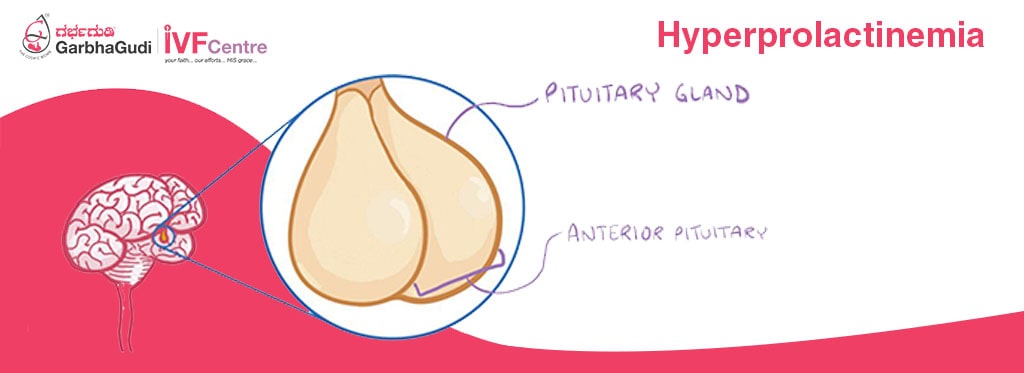Hyperprolactinemia

Becoming parents is one of the happiest moments for a couple. The journey to parenthood isn’t similar in all couples. Sometimes, to achieve parenthood, a couple may need to undergo many treatments. Hormone imbalances are one of the leading causes of infertility. Depending on the hormonal imbalances, ovulation may be disrupted, manifest as irregular or absent periods. Some hormonal problems are caused when the pituitary gland in the brain doesn’t release the proper hormones, or hormone levels are imbalanced due to stress, diet, exercise, radiation, or a condition called polycystic ovarian syndrome (PCOS). PCOS may cause eggs to get released at irregular intervals or stop releasing eggs.
One such hormone which can affect ovulation and cause infertility is Prolactin. Prolactin is a hormone produced by the pituitary gland within the brain. Prolactin has different functions in the body, but the most important is regulating periods and stimulating the breasts to grow and produce milk after giving birth. Once the woman has given birth to a baby, the prolactin level increases, preparing the body for breastfeeding. Too much prolactin in a person’s blood is called hyperprolactinemia. Increased prolactin levels reduce estrogen and interfere with ovulation, causing irregular or absent periods affecting fertility. It also causes non-pregnant women to produce breast milk and lead to low bone density.
Causes of hyperprolactinemia:
Pregnancy and breast-feeding:
There is an increased prolactin level during pregnancy, which is considered normal.
Prolactinoma:
It is a non-cancerous growth in the pituitary gland that increases prolactin production.
Underactive thyroid or(hypothyroidism) and stress:
Adrenaline and cortisol are stress hormones. When coupled with an increased intake of carbohydrates, it creates an imbalance in carbohydrate levels. Because of the inactive thyroid, the brain is stimulated to produce TSH (Thyroid-stimulating hormone) and prolactin, which reduces the estrogen affecting ovulation.
Metabolic and hormonal conditions:
• Any injury or damage to any other part of the body like diseases of the kidneys, liver, thyroid.
• Reproductive disorders like PCOS and amenorrhea can cause hyperprolactinemia.
• Certain medications are used for depression and high blood pressure.
Overactive cells in the pituitary gland:
One of the common endocrinological disorders affecting fertility is Hyperprolactinemia causing anovulatory cycles, luteal phase defects, and sex hormone imbalances. Infertile women have a higher incidence of hyperprolactinemia. However, hyperprolactinemia is a treatable condition, and it is possible to get pregnant if treated in time.
An expert infertility specialist is the best approach for restoring the hormone levels to normal and making conception easier. Infertility has been one of the biggest problems for a long time, but with new treatments evolving, more methods to deal with this problem have surfaced.
Share this page
About Us
GarbhaGudi is a chain of New-Generation Infertility Treatment Hospitals equipped with state-of- art-infrastructure & cutting-edge IVF Technology to address infertility issues & their emotional & mental effects on couples. We have a team of qualified & experienced doctors; their in-depth knowledge & expertise leaves no stone unturned to solve all your infertility issues. The Supportive & caring staff is always by your side to motivate & guide you throughout the journey. GarbhaGudi IVF, the best fertility treatment hospital in Bangalore, provides emotional support to couples facing infertility issues and sexual problems
Contact Us